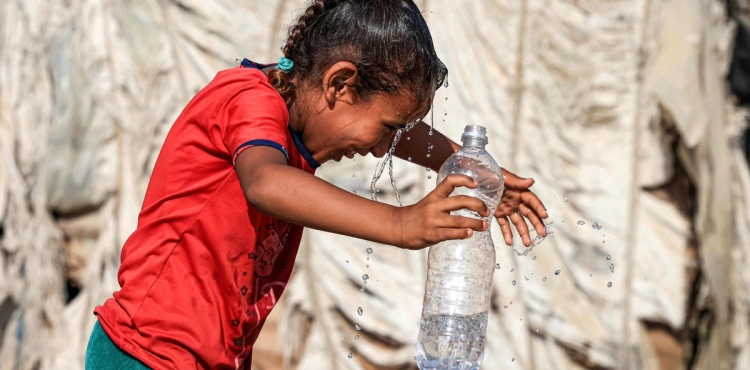Palestinian Yafa Abu Muammar, from the Bedouin village of Umm al-Nasr in the town of Beit Lahia, in the northern Gaza Strip, resorts to water to relieve the unprecedented heat wave that hit the area, which was accompanied by an electricity crisis for her children.
Abu Muammar, 34, a mother of five children of different ages, is forced to use primitive methods by placing her children in plastic containers or using water hoses to shower several times a day in her yard.
The young woman, in her thirties, told Xinhua while she was filling a plastic container with water for her children, that the region has been witnessing a rise in temperatures accompanied by high humidity for several days, and that coincides with the power outages for long hours every day.
Abu Muammar, who complains about the difficult situation in which she lives, adds that what makes the matter worse is that the only power station forced her to pay more money for "lack of services", as she was forced to use prepaid smart meters to get electricity.
Abu Muammar did not previously pay any fees to the electricity company because her family is poor, while she recently paid at least $30 in one month for the lack of electricity, according to the woman.
The same difficult situation is experienced by the elderly Amina Ahmed (60 years) from Gaza City, who is a mother of eight children, saying, "We suffer a lot every night during the hot weather amid a shortage of electricity."
Ahmed adds, "For long hours, my children and I kept moving from one room to another in an attempt to get a cooler place, but all our attempts mostly failed, as it seems that we must suffer a lot during the entire current summer season."
Both Amina and Yafa accused the Electricity Distribution Company and local authorities in the Strip of investing in the electricity shortage crisis to earn more money from people who often suffer from poverty.
The two women told Xinhua that over the past 16 years, the local authorities have received "tens of millions of dollars in donor funds, but they have not been able to solve the electricity problem, which is getting worse with the onset of summer."
The coastal strip, home to more than two million people, needs about 500 megawatts of electricity per day, while it receives 120 megawatts from Israel, while the only power plant in Gaza generates 60 megawatts, according to officials in the Strip.
Locals would see electricity delivered in the fall and spring seasons for eight hours based on available power, while there are eight hours of outage. Moreover, the shortage will reach 12 hours during the summer and winter seasons.
The head of the Energy Authority in Gaza, Jalal Ismail, told Xinhua that "the summer heat wave has exacerbated the current energy crises and showed more deficit," noting that the solution to the crisis must be political by ending the internal Palestinian division that began in mid-2007. .
The Palestinian Authority, which pays for the electricity that goes to the Strip from Israel, blames the Islamic Resistance Movement (Hamas) for the crisis, and says that the movement is responsible for collecting electricity revenues.
On the other hand, Palestinian activists on the social networking site (Facebook) launched a protest campaign against the prevailing situation, calling for urgent and quick solutions in light of the heat wave.
Some residents of the Strip also resorted to sharing photos and short videos showing the elderly and children struggling due to the heat wave without having the ability to operate their respirators.
"The campaign aims to encourage residents to raise their voices against the local authorities and the Gaza Electricity Company, who do not care about the people who suffer during the hot summer," activist Reem Fares told Xinhua.
Fares lamented that some officials in Gaza and the West Bank "traded the suffering of the population in exchange for collecting money from donors to raise their personal wealth only."












